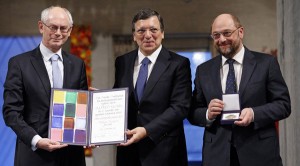 Hailing the European Union as “the most dramatic example in history that shows that war and conflict can be turned into peace and cooperation,” Nobel committee chairman Thorborn Jagland presented the Nobel Peace Prize to top EU officials at a ceremony Monday in Oslo.
Hailing the European Union as “the most dramatic example in history that shows that war and conflict can be turned into peace and cooperation,” Nobel committee chairman Thorborn Jagland presented the Nobel Peace Prize to top EU officials at a ceremony Monday in Oslo.
The award to the 27-nation EU for advancing peace, reconciliation, democracy and human rights, was handed to its three leaders, Herman Van Rompuy ( Pictured L) , president of the European Council; Jose Manuel Barroso ( C) , president of the European Commission; and Martin Schulz ( R) , president of the European Parliament.
An appreciative audience on hand included German Chancellor Angela Merkel, French President Francois Hollande, and leaders of European member states and institutions along with the Norwegian royal family.
Van Rompuy, in accepting the award, paid homage “to all the Europeans who dreamt of a continent at peace with itself, and to all those who day-by-day make this dream a reality.
“War is as old as Europe,” he reminded his audience. “Our continent bears the scars of spears and swords, cannons and guns, trenches and tanks, and more.”
But “keeping peace where there is peace” is “another historic task….This couldn’t be more clear than it is today, when we are hit by the worst economic crisis in two generations…..putting the political bonds of our Union to the test.”
In a nod to critics who point to Europe’s ongoing divisive financial turmoil, Barroso, his own remarks, acknowledged that, “European unity is not a perfect work of art; it is work in progress that demands constant and diligent tending…Despite its imperfections, the European Union can be, and indeed is, a powerful inspiration for many around the world,.”
He also defended the EU’s currency. “Today one of the most visible symbols of our unity is in everyone’s hands. It is the Euro, the currency of our European Union. We will stand by it.”
The EU, Barroso said, “is more than an association of states. It is a new legal order, which is not based on the balance of power between nations but on the free consent of states to share sovereignty.”
LA Times

Leave a Reply
You must be logged in to post a comment.